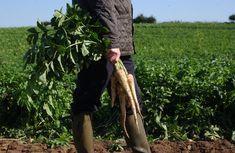
Consumers in the UK could be facing massive increases in fruit and vegetable prices unless greenhouse gas emissions are curbed, a new study from the University of Manchester claims.
The research, from the university’s Sustainable Consumption Institute, claims fresh vegetables could rise to “unaffordable levels” if global temperatures continue to move towards the 4ât°C mark.
Across the world, non-carbon emissions, such as those coming from agriculture, currently make up around 25 per cent of total emissions, compared to 10 per cent in the UK.
The report contends that if worldwide temperatures rise by 4ât°C or more, the global volume of crops could decrease by 30 per cent, creating mass food shortages and price inflation.
Dr Alice Bows, who led the two-year study, explained: “In countries like the UK, policymakers have focused so much on the CO2 emissions linked to energy that agriculture and food has been overlooked.
“This report shows that agricultural emissions will be more challenging to cut, placing even greater pressure on the energy sector to de-carbonise.”
The report states that only a quarter of people globally manage to eat the recommended five portions of fruit and vegetables a day, while overall consumption is falling. Fruit and vegetables are listed as the food most likely to be wasted by households, with 17 per cent of food purchased currently thrown away.
Bows added: “The failure of the global community to put meaningful policies in place to urgently cut emissions means that we are facing future temperature increases of around 4°C, which will be devastating to agriculture and will fundamentally alter food provision.”
Andrew Rigg, a farmer at Winchester-based Hill View Farm, added: “Farmers and others in the food chain need to not only reduce their greenhouse gas emissions, but to develop systems, technologies and methodologies that allow them to adapt to the particular way in which climate disruption manifests itself in their region.
“Policy-makers need to put in place policies that are flexible enough to enable the food chain to respond to whichever scenario emerges over the coming decades.”



